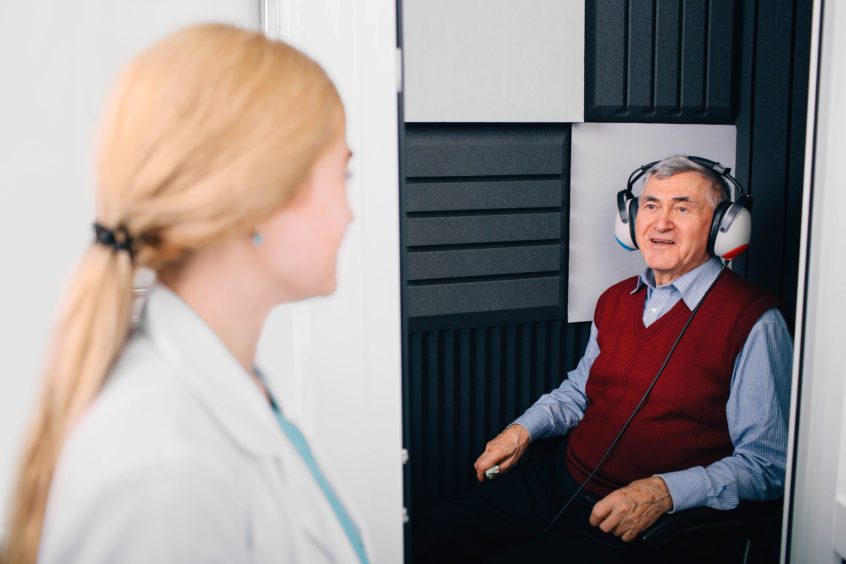Being quarantined with close family these past few months has meant trying to communicate effectively, and for many the “togetherness” has highlighted communication challenges, especially hearing loss. Shortcomings you might have ignored before may have become more noticeable than ever, perhaps even annoying. And many people want to do something about it—but who can they turn to?
The answer is an audiologist. An audiologist is a doctoral-level professional who specializes in the diagnosis and non-medical treatment of hearing loss, tinnitus, and balance disorders.
Audiologists can:
- Test/evaluate hearing and balance
- Recommend, fit/dispense, service, and adjust hearing aids
- Recommend and provide assistive listening devices (products to enhance telephone conversations, television viewing, etc.)
- Provide tinnitus assessment and management
- Provide education regarding the effects of noise on hearing and options for prevention of hearing loss
- Deliver aural rehabilitation and counseling related to hearing loss/tinnitus rehabilitation (counseling, education, auditory training/exercises)
- Assess balance, dizziness and vertigo with treatment for dizziness from Benign Paroxysmal Positional Vertigo (BPPV)
Education and Training
Audiologists receive extensive education in hearing and balance disorders. These professionals have earned postgraduate masters and/or doctoral degrees. A doctoral degree is required for graduates practicing after 2012. You may look for the initials Au.D., (Doctor of Audiology—clinical degree); Ph.D. (Doctor of Philosophy—research and/or clinical research degree); or Sc.D. (Doctor of Science—usually a clinical degree) to designate doctoral training.
As part of their four-year doctoral training, audiologists spend a final year completing an externship experience supervised by a licensed audiologist. The externship provides practical, hands-on, advanced experience.
Specialization
Audiologists specialize in a variety of areas, including prescribing, fitting, and adjusting hearing aids and other hearing assistive devices. In addition, audiologists also screen the hearing of newborns, teach listening skills and strategies, assess individuals with central auditory processing disorders, diagnose and manage tinnitus and misophonia (sound sensitivity) and diagnose and treat dizziness and balance disorders.
Audiologists may be invited to provide clinical teaching and adjunct clinical supervision at universities and colleges that have audiology programs.
Signs You Need an Audiologist
Asking “What?” a lot is just one sign that you might need the expertise of an audiologist. Ask yourself these questions below, and if you answer “yes” to any of them, it could be a sign you need an audiologist’s help:
- Do you experience ringing or hear noises in your ears?
- Does one of your ears hear much more clearly than the other?
- Do you have difficulty following conversations in a noisy restaurant or crowded room?
- Do you feel that people mumble or fail to speak clearly?
- Do you have difficulty listening to the TV or radio?
- Do you find it difficult to understand the speaker at a public meeting or religious service?
- Does your difficulty hearing interfere with your personal, family or social life?
Hearing Aid Technology
If a hearing evaluation shows you have a hearing loss, the audiologist may recommend hearing aids for you. Hearing aids are medical devices regulated by the Food and Drug Administration (FDA). They must be recommended, prescribed, and fit by licensed professionals. This standard is in place to protect the individual with hearing loss, because not all individuals are candidates for hearing aids. And for those who do need hearing aids, following state licensure laws and best practices for dispensing hearing aids is critical.
There are hundreds of hearing aids available with a wide variety of features. An audiologist not only uses advanced diagnostic testing to determine your type of hearing loss, but can use this information to determine the best hearing aid solution for your specific needs and budget.
Today’s digital hearing aids utilize tiny computer processors. They can be programmed, but if they are not adjusted correctly for your specific hearing loss, you could purchase a hearing aid and not receive the full benefit. An audiologist who follows best practices and uses the correct verification equipment with the expertise to program your hearing aids for your individual hearing needs.
Associated Audiologists
The Associated Audiologists team features professionals who use advanced diagnostic and verification technology to diagnose and treat hearing loss. The practice offers digital hearing aid products from the world’s most respected manufacturers backed by unparalleled service. We also have experts who specialize in diagnosing and managing tinnitus and sound sensitivity, and dizziness and balance disorders.
Each of our associates is a doctoral-level audiologist. Our audiologists are members of the Academy of Doctors of Audiology (ADA) and hold certificates of clinical competence in audiology from the American Speech-Language-Hearing Association (ASHA). Many of our team members are also clinical supervisors at the University of Kansas Medical Center and other regional audiology training institutions.
Schedule an appointment with a doctoral-level audiologist today.



